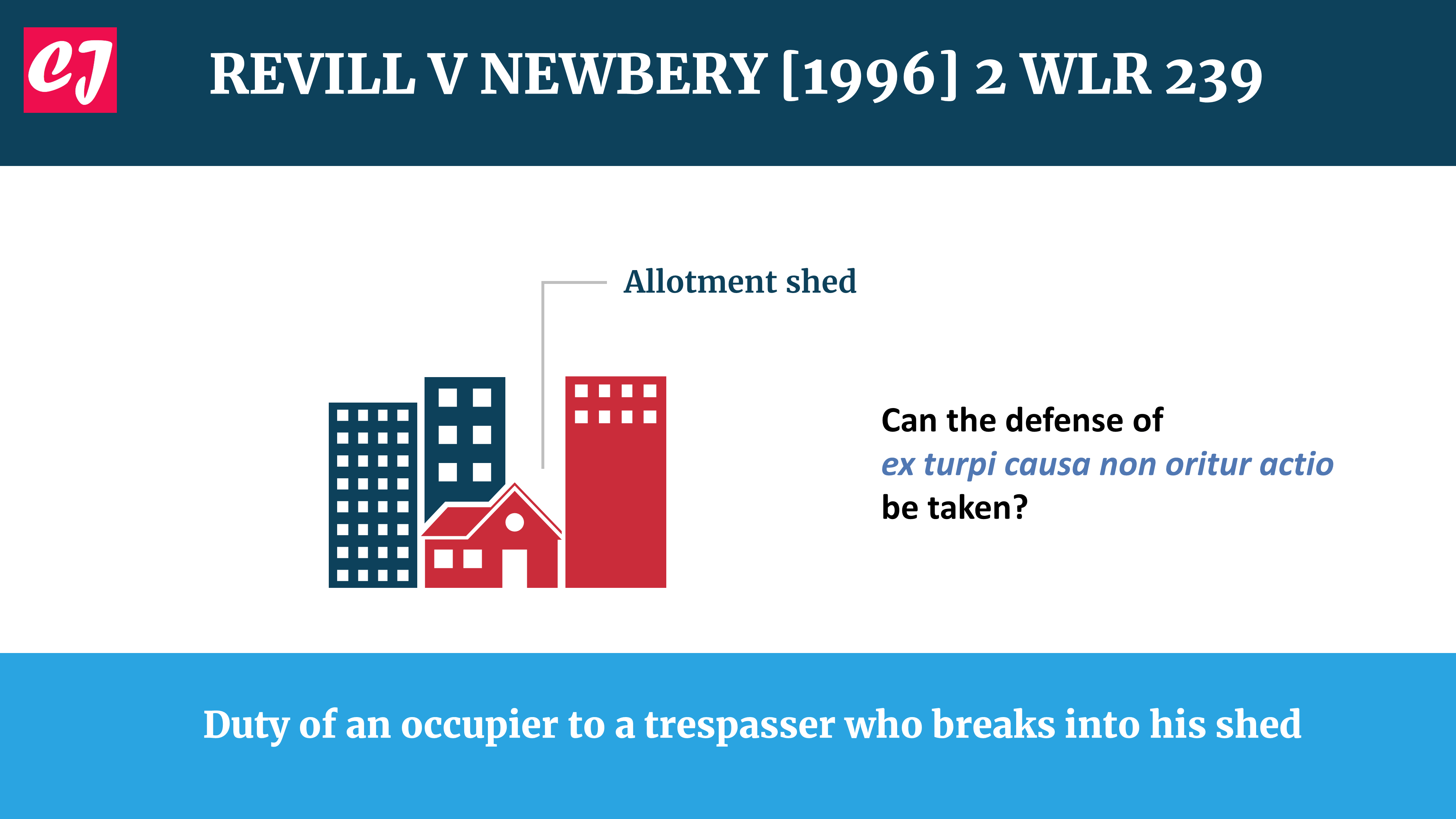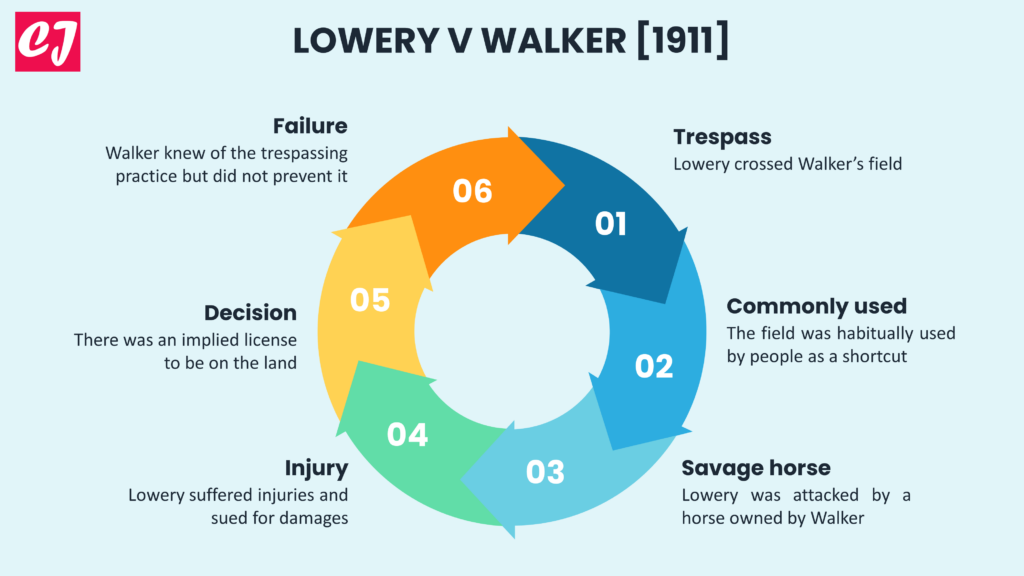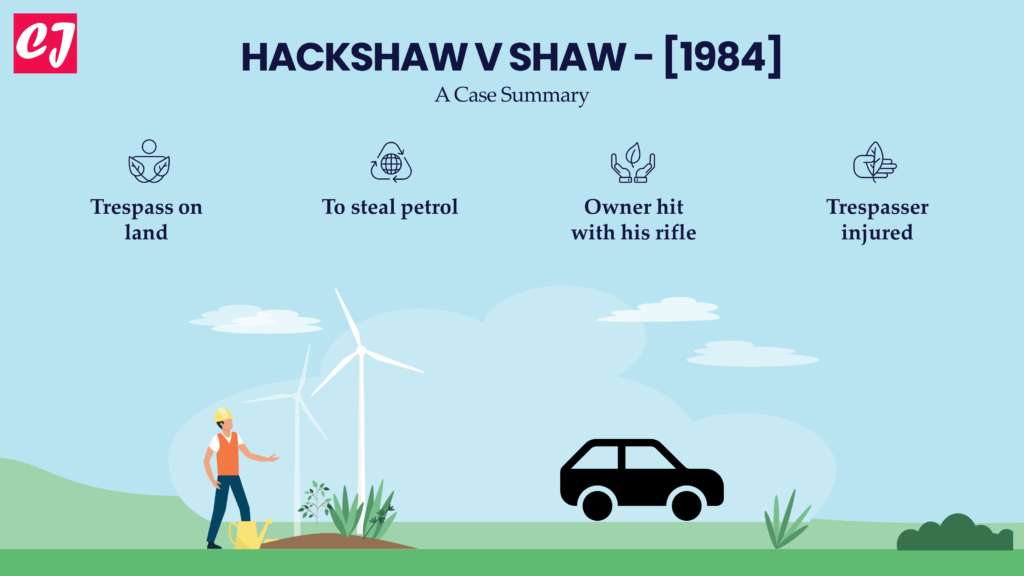
Revill v Newbery [1996]: A Case Summary
Case name & citation: Revill v Newbery [1996] QB 567; [1996] 1 All ER 291; [1996] 2 WLR 239
- Court and jurisdiction: Court of Appeal (Civil Division), England and Wales
- Decided on: 02 November 1995
- The bench of judges: Neill LJ, Evans LJ, Millett LJ
- Area of law: Occupier’s liability; Negligence; Trespass to land; Contributory negligence
What does the case deal with?
Revill v Newbery [1996] deals with issues related to trespass and self-defense. To what extent can force be used to protect one’s property?
Facts of Revill v Newbery
Newbery, a 76-year-old pensioner, was the owner of an allotment shed. There were previous break-ins in his shed so he decided to sleep in it to protect from intruders.
One night, a man named Revill accompanied by Grainger, attempted to break into the shed. With a view to frighten them away, Newbery used his 12-bore shotgun and fired a shot through a hole in the shed’s door. In doing so, he hit Revill and caused him serious injuries.
Criminal proceedings were initiated. Revill admitted he attempted to burgle the shed and was prosecuted accordingly. Newbery was charged with wounding offenses but was subsequently acquitted.
However, Revill brought civil actions against Newbery. He sued him for negligence and breach of duty under the Occupiers’ Liability Act 1984. He sought damages for the injuries suffered as a result of the gunshot fired by Newbery.
Defense of ex turpi causa
Newbery took the defense of the doctrine of ex turpi causa non oritur actio which means that no legal action can be founded on an immoral or illegal act. He claimed that since Revill attempted to burgle his shed, he shouldn’t be allowed to bring an action against him.
In addition, Newbery also contended that even if Revill were allowed to bring an action, his damages should be reduced by two-thirds. He was contributorily negligent for his injuries as he attempted to break-in the shed in the first place.
That is, his own actions were illegal and had contributed to the resultant injuries.
Issue
The main issue in this case was whether Newbery had a duty to prevent harm to trespassers like Revill and whether that duty was breached.
Court’s judgment in Revill v Newbery
In the first instance, the judge ruled in favor of Revill but reduced the amount of damages on account of contributory negligence.
The judge found that Newbery was negligent and that his actions fell below the standard of care that a reasonable person would exercise in similar circumstances. He had used violence in excess of reasonable or justifiable limits.
Newbery appealed.
The Court of Appeal considered the case in connection with s.1(3)(b) of the Occupiers’ Liability Act 1984.
Lord Justice Neill pointed out that Newbery had not just fired a warning shot in the air to frighten the intruders. Instead, he fired a gunshot at a horizontal level where people in the vicinity could easily be hurt.
Even though Newbery couldn’t see who was behind the door, he believed that someone was there and took direct action to injure them.
Further, the defense of ex turpi causa was rejected. Newbery’s liability for negligence should not be absolved merely because Revill himself had engaged in an illegal act (burglary). Under Section 1 of the Occupiers’ Liability Act 1984, an occupier cannot treat a trespasser as an outlaw. This means that an occupier owes a duty to a trespasser to ensure that the trespasser does not suffer injury while on the premises.
Hence, the Court of Appeal dismissed the appeal.
References:
- https://shura.shu.ac.uk/9692/8/Dickinson_OpenSeasonFor%28AM%29.pdf
- https://www.lawteacher.net/cases/revill-v-newbery.php
You might also like:
More from tort law:

